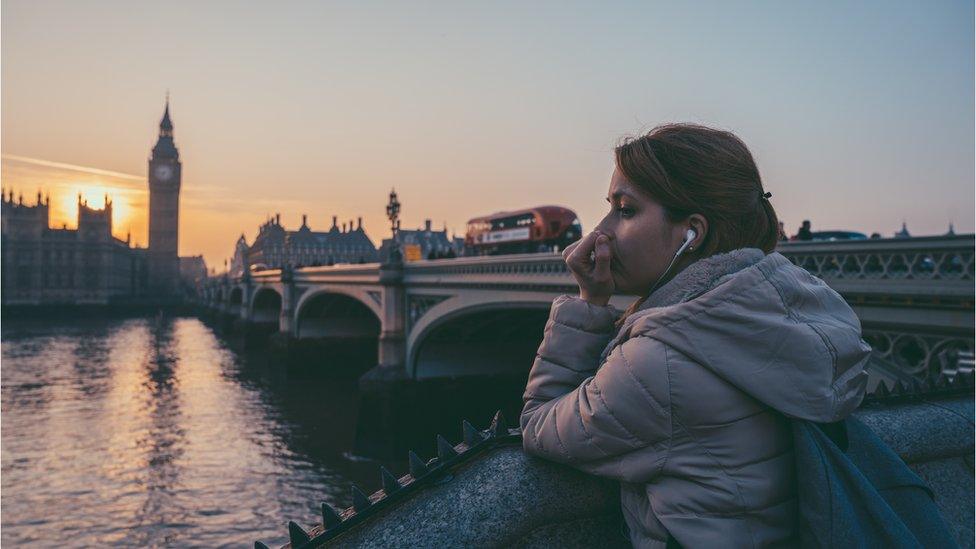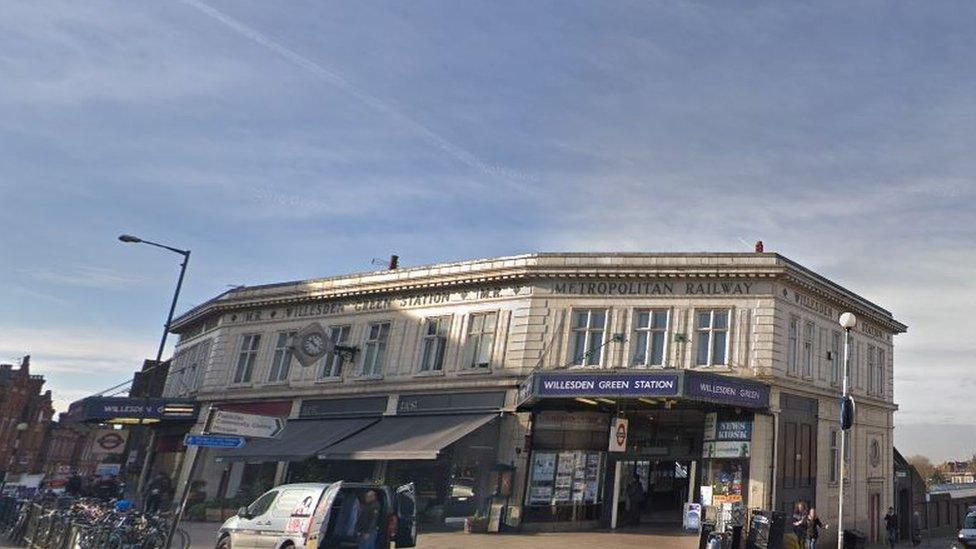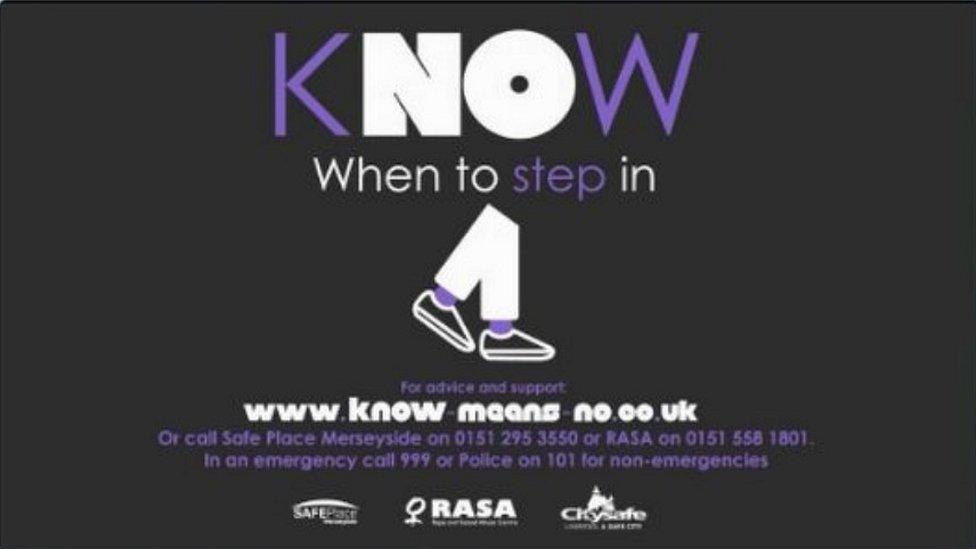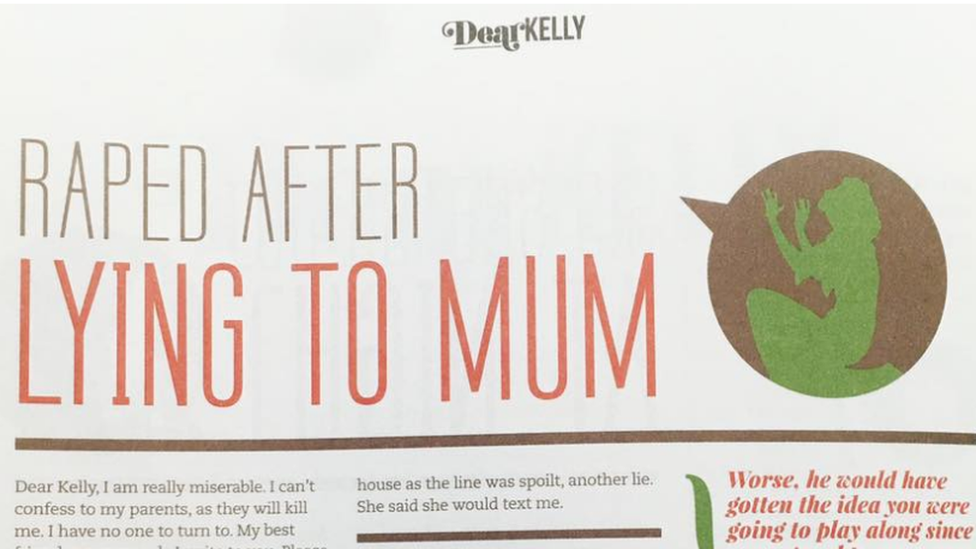Victim blaming: Is it a woman's responsibility to stay safe?
- Published

'Always be alert in your surroundings, so don't use earphones or handheld devices' police advised women
Women have been urged not to wear headphones or use mobile phones following a string of sexual assaults in north-west London. Is this a form of victim blaming or necessary advice in an imperfect world?
There have been 10 sex attacks on lone women in Cricklewood since February. Police revealed more details about the assaults on Tuesday, including the attacker's modus operandi.
In most cases, which have taken place near Willesden Green Tube station, the man approached a lone woman, tried to chat to her, asked for a kiss or a hug and then sexually abused her.
The Metropolitan Police arrested a man and later released him under investigation. But their safety advice to women provoked criticism.
"I would appeal to women in the local area to take care when they are walking, especially if they are alone," said Det Con Laura Avery.
"Always stick to well-lit streets. If possible, let someone know when you are coming home and the route you are taking and always be alert in your surroundings, so don't use earphones or handheld devices."
Practical, universal safety tips?
Or an unfair onus on women to change their day-to-day, law-abiding, behaviour?

Jessica Eaton said it was time to "stop this victim blaming"
Jessica Eaton, who campaigns on behalf of the victims of sexual violence, called the advice "ridiculous" and "useless".
"No-one will talk about the most common denominator here," she said.
"Headphones don't rape women, nor do skirts, or dark streets, or clubs, or alcohol, or parties, or sleepovers, or school uniforms.
"Name the perpetrators. Name the problem. We can't help if we can't even name it."
She added there was a hypocrisy to the police's sexual assault message and that given out following other types of crime.
"When there is a terrorist attack, government, police and public figures say 'we will not change our way of life, we will not change our behaviours... we will carry on as normal because we deserve a safe society'.
"But when women are being raped and assaulted, government, police and public figures say 'women, change your behaviours... do something different'. Why are women supposed to change their lives and their behaviours for sex offenders?"
Her sentiments were mirrored online in response to the BBC's story.
Allow X content?
This article contains content provided by X. We ask for your permission before anything is loaded, as they may be using cookies and other technologies. You may want to read X’s cookie policy, external and privacy policy, external before accepting. To view this content choose ‘accept and continue’.
Allow X content?
This article contains content provided by X. We ask for your permission before anything is loaded, as they may be using cookies and other technologies. You may want to read X’s cookie policy, external and privacy policy, external before accepting. To view this content choose ‘accept and continue’.
Charlotte James, a 28-year-old marketing manager, tweeted:
Allow X content?
This article contains content provided by X. We ask for your permission before anything is loaded, as they may be using cookies and other technologies. You may want to read X’s cookie policy, external and privacy policy, external before accepting. To view this content choose ‘accept and continue’.
"While I'm sure the advice is well intended, it's very problematic," she added.
"The narrative puts the victim at fault, rather than the criminal. We so frequently hear reports of attacks which detail the behaviour of the victim: what they were wearing, where they were, what time of day, if they were alone, if they had consumed alcohol.
"All of these things suggest that those choices were naive, foolish, dangerous, or incorrect in some way."
She added that such advice "creates a culture of fear - and not just for women".
"It means people fear going out alone in the dark, or wearing outfits society might deem 'provocative', or enjoying a drink on a night out," she said.
"I'm a grown woman, I shouldn't need a chaperone. Advice such as this polices the behaviour of innocent people, rather than the actions of criminals."
Siobhan Tatum, a legal professional, tweeted that women often wore headphones precisely to deter male attention.
Allow X content?
This article contains content provided by X. We ask for your permission before anything is loaded, as they may be using cookies and other technologies. You may want to read X’s cookie policy, external and privacy policy, external before accepting. To view this content choose ‘accept and continue’.
However, the Met told the BBC it was offering "personal safety advice that applies to everyone" and urged people to look at its website for further information, external.
Many also pointed out people's personal responsibility in keeping themselves safe.
Allow X content?
This article contains content provided by X. We ask for your permission before anything is loaded, as they may be using cookies and other technologies. You may want to read X’s cookie policy, external and privacy policy, external before accepting. To view this content choose ‘accept and continue’.
Mary Thro said on Facebook: "We are all responsible for our personal safety, everyone should take steps to prevent becoming a victim. A good place to start is to cut out distracting behaviour such as mobiles and earphones so that you are more aware of your surroundings.
"In a non-existent utopia people wouldn't have to take these measures but we aren't living in utopia."
- Published9 October 2018

- Published19 August 2018

- Published14 November 2016
